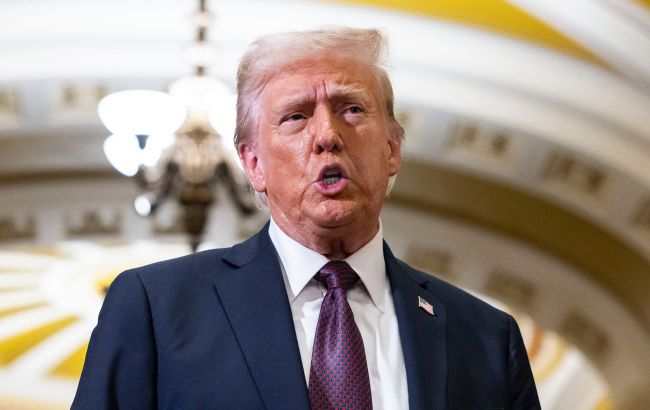American blindness. How US repeats its mistakes and their consequences for Ukraine
 Donald Trump (Photo: Getty Images)
Donald Trump (Photo: Getty Images)
From Trump’s trade wars to failures in Afghanistan and the Middle East, America keeps repeating old mistakes, risking not only its own reputation but also global stability. Why does the world’s most powerful nation fail to learn from its missteps, and what does this mean for Ukraine?
Read the material by RBC-Ukraine to learn more.
Takeaways
-
Why does the US, despite its global power, repeatedly face failures on the international stage?
-
What influences the actions of US politicians around the world, and why do they so often make mistakes?
-
How does Russia take advantage of US miscalculations?
In John Steinbeck’s novella Of Mice and Men, there’s a character named Lennie, enormously strong but mentally challenged. So much so that he can kill a person he simply wanted to hug. While the American classic wrote about different times, today’s US often resembles Lennie in many ways. The country remains the most powerful in the world and can still, at any moment, shake the global order. A case in point: Trump’s trade war, which in just a few days nearly triggered a global economic crisis.
In other areas, the US president has not yet caused irreversible damage, but the risk is there. The terms of the war-ending deal Trump is pushing do not mean peace, but rather a temporary ceasefire during which Russia could recover and launch a renewed offensive against Ukraine and Europe.
At the same time, current American leaders continue to repeat the mistakes of their predecessors, seemingly having learned nothing from them.
Leadership and responsibility
The US, due to its global status, regularly becomes involved in conflict situations around the world. Sometimes it is by its own initiative, and at other times, it is compelled to respond to calls for its role as the "world's policeman." However, the US's reaction to international crises is often chaotic and disorganized. Decisions are made through the lens of personal beliefs, emotions, the desire to maintain its reputation as the "beacon of democracy in the world," as well as mercantile interests and the influence of various lobbies.
The combination of these factors plays out differently in each case, and there have been instances where the US has made its own situation more difficult, deepened the problem instead of solving it, or even suffered a complete failure.
One of the most illustrative examples of this is the case of Egypt, a long-time US ally, during the Arab Spring — a series of revolutions that swept across the Middle East in 2011. As in other countries in the region, the US-allied regime of Hosni Mubarak was rocked by protests.
At the time, US President Barack Obama personally called Mubarak and urged him to step down. In the end, Mubarak succumbed to pressure from both within and outside the country.
Later, in the elections, representatives of Islamist parties won - groups with which the US had little contact. The new president, Mohamed Morsi, failed to unite Egypt. On the contrary, the situation became more unstable, threatening to create problems for the entire region.
Amid this, the Egyptian military, led by General Abdel Fattah el-Sisi, staged a coup. This posed a new dilemma for the US — whether to support the new government. On the one hand, the military had clearly acted undemocratically, but on the other hand, they had significant support from the Egyptian population, who were dissatisfied with the chaos under the Islamists. Additionally, the military appeared to be a far more reliable partner for US interests in the Middle East. According to US law, recognizing the coup would have meant an automatic cessation of all American aid.
William Burns, CIA Director under Biden and the State Department's Middle East head during the Arab Spring, recalled that they had spent hours in the White House Situation Room trying to figure out how to avoid the necessity of halting aid to Egypt. He explained that lawyers and those who considered themselves as such wrote and rewrote formulations that they believed might allow them to skillfully sidestep the problem.
However, soon after, el-Sisi's regime began a new wave of repression, this time against the Islamists, and Obama, with a firm decision, halted military aid to Egypt. Burns recalled that, as a result, they had managed to alienate practically everyone—they angered both the imprisoned Islamists and the repressed revolutionaries, as well as their friends and partners in the region, not to mention the Egyptian military and the US Congress.
The US spent years trying to restore relations with Egypt and other allies, but at least it was possible. In modern history, the US has faced more disastrous cases.
Afghanistan. Inability to see the essence of the problem
The decision to invade Afghanistan after the 9/11 al-Qaeda terrorist attack in 2001 was emotional. This is confirmed in the memories of most US officials involved in making that decision. The formal goal of the invasion — overthrowing the Taliban regime that had harbored the terrorists responsible for the attack — was achieved in 75 days, or so it seemed at the time.
However, it is not so simple to just enter Afghanistan without consequences. In order to prevent al-Qaeda and the Taliban from returning, the US tried to build a democratic state with a strong army. However, the results were questionable. Even at its best, the US-backed government did not control the entire territory of the country. For the US, Afghanistan turned into a problem — soldiers were dying, billions were being spent on the contingent, but the clear purpose of the war was not obvious from the perspective of the average American. Thus, during his first presidential term, Trump began negotiations with the Taliban to withdraw US troops. He did not manage to finish the process, and his successor, Joe Biden, had to do it.
And this had catastrophic consequences. The democratic government of Afghanistan collapsed within weeks after the US military withdrawal in 2021, under the blows of the very same Taliban, which had not been fully defeated.
According to US experts, this happened because the US, like the USSR before it, failed to take ethnic factors into account. Afghanistan does not have a single dominant ethnic group. Even the largest, the Pashtuns, make up less than half of the population. In addition, there are Tajiks, Uzbeks, and others. But it so happened that the Pashtuns were the group around which the government was formed. And they were the core of the Taliban, which managed to present its fight against the US as a national liberation struggle. Furthermore, while the US built the Afghan army, it failed to create an effective police force.
In the realities of Afghanistan, soldiers come and go from bases, while police officers stay on the ground every day.
As a result, the events in Afghanistan became a public humiliation for the US in the eyes of the entire world. More importantly, the US continued the disgraceful practice, started in Vietnam, of abandoning their partners and allies to their fate.
This, in turn, calls into question the reliability of US commitments worldwide. Especially during Trump’s era, with his rhetoric about not wanting to defend allies who spend too little on defense.
Pursuit of illusory goals
One could philosophically view the shortcomings of US policy, but they have led to the strengthening of America’s enemies, a trend that has already affected Ukraine. By focusing on the Middle East in the 2000s, the US missed the resurgence of aggressive Russia. Although Putin openly stated his intentions as early as 2007 during the infamous Munich Security Conference, his words were not taken seriously. Moreover, there was hardly anyone around to take them seriously.
In 1989, at the time of the fall of the Berlin Wall, there were about 12,000 analysts in the US working on Soviet affairs. By the time of Russia’s invasion of Ukraine in 2014, that number had dropped to around a thousand, covering not just one large country but all 15 that emerged from the ruins of the Soviet Union.
Budget allocations for this area decreased from about 50% to 13%. Additionally, an entire generation of young people in the government and intelligence services decided that there were no real career prospects in the Russian field and preferred to focus on the fight against terrorism or China.
The situation improved slightly after 2014, but now trends are again concerning. As reported by the New York Times on March 6, government budget cuts in the US, initiated by the Trump administration, affected the CIA, among other agencies. This was in addition to Trump’s tendency to trust not intelligence data, but the words of his friend, Stephen Witkoff, who had been influenced by Russian narratives during his meetings with Putin.
Of course, many of Trump’s actions do have internal logic. The problem, however, is that this logic relies on a flawed, often oversimplified understanding of reality, and instead of sober assessments, it’s based on subjective judgments and outright false data. Knowing all these flaws, US enemies actively take advantage of them. It is now clear that, in the context of Ukraine, Putin managed to exploit Trump’s materialism and play on his vanity.
In such conditions, Ukraine’s only option is to build relationships with responsible partners. In the US, it’s essential to understand who one is dealing with and, as much as possible, maintain those relationships while it remains feasible.
Sources: statements by American politicians, publications from the New York Times, Politico, The Atlantic, the memoirs of William Burns Invisible Power: How American diplomacy works, and the book Age of Danger: Keeping America Safe in an Era of New Superpowers, New Weapons, and New Threats by Andrew Hoehn and Tom Shanker.

